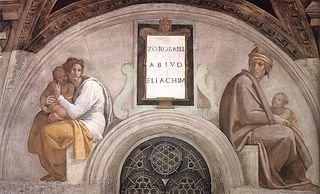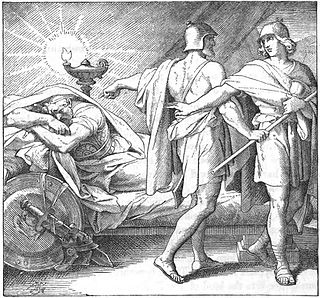Related Research Articles
Abijah is a Biblical Hebrew unisex name which means "my Father is Yah". The Hebrew form Aviyahu also occurs in the Bible.

Abarim is the Hebrew name used in the Bible for a mountain range "across the Jordan", understood as east of the Jordan Rift Valley, i.e. in Transjordan, to the east and south-east of the Dead Sea, extending from Mount Nebo — its highest point — in the north, perhaps to the Arabian desert in the south.
The name Abda means servant, or perhaps is an abbreviated form of servant of YHWH. There are two people by this name in the Hebrew Bible.
Ebez also rendered Abez, was a town in the allotment of the tribe of Issachar, at the north of the Jezreel Valley, or plain of Esdraelon. F. R. and C. R. Conder (1879), believed that it was probably the ruins of el-Beida, but William Robertson Smith (1899) expressed doubt about this identification. According to the 1915 International Standard Bible Encyclopedia (1915), the location is not known. It is mentioned only in Joshua 19:20, where various manuscripts of the Septuagint render it as Rebes, Aeme, or Aemis. It is mentioned on the façade of the Mortuary Temple of Ramesses III at Medinet Habu as Apijaa.

There are two biblical characters named Abihud.

Achsah, was Caleb ben Yefune's only daughter. Her name comes from the word for "anklet", עכס (ekes).
Adriel was a person mentioned in the Bible. Adriel was a nobleman in the ancient kingdom of Israel.
Zerah or Zérach refers to several people in the Hebrew Bible.
According to the Book of Joshua, Adonizedek was king of Jerusalem at the time of the Israelite invasion of Canaan. According to Cheyne and Black, the name originally meant "Ṣedeḳ is lord", but this would likely have been read later as meaning "lord of righteousness" or "my lord is righteous".
Abinoam, from Kedesh-naphtali, was the father of Barak who defeated Jabin's army, led by Sisera. He is mentioned only in Judges 4:6, 4:12 and 5:12.
Berechiah is a Jewish name that occurs several times in the Bible. It is derived from Berakhah, "blessing".
Kerioth is the name of two cities mentioned in the Hebrew Bible. The spelling Kirioth appears in the King James Version of Amos 2:2. The name means "cities," and is the plural of the Biblical Hebrew קריה.
- A town in the south of Judea. Judas Iscariot may have been a native, hence his name "Iscariot".
- A city of Moab, called Kirioth.

Abishai was a military leader under the biblical King David. He was the eldest son of David's sister Zeruiah. According to Josephus his father was called Suri. The meaning of his name is "Father of a gift". He was the brother of Joab and Asahel.
References
![]() This article incorporates text from a publication now in the public domain : Easton, Matthew George (1897). "Adiel". Easton's Bible Dictionary (New and revised ed.). T. Nelson and Sons.
This article incorporates text from a publication now in the public domain : Easton, Matthew George (1897). "Adiel". Easton's Bible Dictionary (New and revised ed.). T. Nelson and Sons.